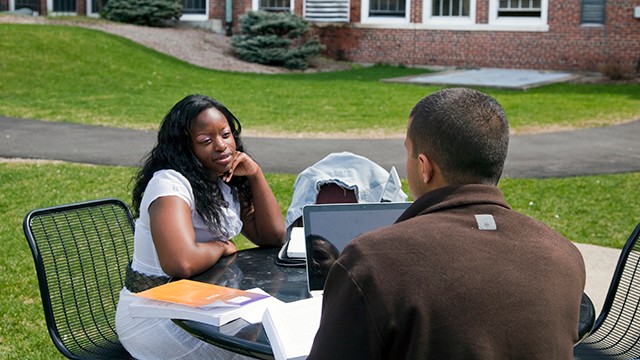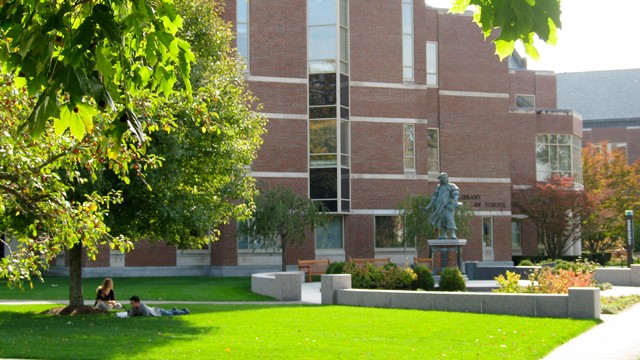

The accelerating globalization of law and legal practice places important new demands on legal education. At BC Law, we understand that globalization magnifies the scope and complexity of law and legal practice. Our Global Law Program trains students for the needs of today, while giving them skills and perspectives that anticipate the needs of tomorrow.
BC Law offers a comprehensive program in international and comparative law delivered by a world-class faculty.
The program is holistic, yet flexible. Students may design an intensive program which can include courses and clinical programs, law review opportunities, moot court experiences, exchange and joint degree programs, and summer employment.
Our educational objective for JD students in international exchanges is exposure to foreign legal systems, appreciation for transnational and international legal frameworks, and comparative perspective on law. JD students additionally gain intercultural competence and practical knowledge of how international legal systems function.
In our international Semester-in-Practice externship program, students are placed in Dublin in private businesses, law firms, and public organizations and participate in a weekly seminar. The program also offers externships throughout Europe, where students use videoconferencing to participate in the seminar.
This clinic allows second- and third-year law students to immerse themselves in real-world immigration legal work on behalf of indigent asylum seekers, immigrants, and certain non-citizens detained by the INS. International clients include individuals from Central America, Southeast Asia, and Africa. First-year law students may spend spring break volunteering with front-line immigrant legal service organizations such as the Haitian Catholic Center Legal Project, the Lutheran Ministries, the Catholic Legal Immigration Network, and the Florida Immigrant Advocacy Center. Students, supervised by BC Law School faculty members, advise and counsel clients and conduct legal and factual research for public interest attorneys.
Bucerius Law School, the first private law school in Germany, offers a program in International and Comparative Business Law during the fall semester. The program is taught in English to a group of 90 students from all over the world. In addition, students whose knowledge of German is sufficient may take courses in the school's regular curriculum. A preliminary course list can be found on Bucerius' course list document. You may download an information sheet on the program below. You may also download a PDF of the Bucerius academic calendar. Boston College Law School students apply through nomination from the BC Office of International Programs, as described by Bucerius here. Contact Sabrina Henning, Programs Coordinator directly with any questions you have at sabrina.henning@law-school.de. BC Law also offers a joint JD/LLM program with Bucerius (see below).
Esade Law School is ranked as Spain’s top private university for studying law. It is located in Barcelona with satellite location in Madrid, Buenos Aires, and Casablanca. Esade is the only law school in Spain that offers the European Joint Degree in Business Law. Students also have the opportunity to add an American LLM to their Spanish MUA by enrolling in the two-year International Double Degree program. During their first year, students will complete the MUA + Master of Specialization at Esade. Their second year will be spent completing the LLM program in the United States at one of the following law schools: University of Pennsylvania Carey law School, Fordham University School of Law, Cardozo Law School, or Georgetown University Law Center. Further information is included in this fact sheet.
Pontificia Universidad Javeriana was founded in 1623 and is one of the most prestigious universities in Colombia, and the oldest Jesuit University in the Americas. The language of instruction is Spanish. The University contains a diversity of law courses available to students. Further information is included in this fact sheet and information relating to living expenses is available here.
Trinity College School of Law. Trinity is Ireland’s oldest and most internationally renowned law school, established in 1740. Trinity also offers a broad range of law courses, from its advanced graduate offerings across law subjects in the international, EU and Irish law spheres.
More information on the course modules can be found on Trinity's LLM website, from which BC students can take courses. You can also find more information about the program on the Trinity Fact Sheet.
Renmin University Law School was the first law school founded after the formation of the People’s Republic of China. BC Law students are nominated through the BC Law International Programs Office. Students are able to take graduate level courses in either the English language program on Chinese Law or, if the student is fluent in Mandarin, in the regular graduate-level law courses taught in Chinese. You can find further information about Renmin University's law program here and course offerings here, with on-campus housing options available here.
The Sorbonne JD/LLM Program offers law students in-depth acquaintance with the intricacies of French and European Law and a new perspective on current global legal issues while learning in the best of the French academic tradition and Civil Law methodological techniques. There is an externship opportunity during the spring term, which places students in French law firms, businesses and nonprofits and gives them an immersive real-world experience in the practice of foreign law.
The Program, taught in French, is a collaborative effort with the Sorbonne Law School of the Université Paris 1 Panthéon Sorbonne, one of the oldest and most prestigious universities in the world. Only a handful of U.S. schools have a joint degree program with the Sorbonne, putting participating students into a select group of global practitioners.
Upon completion of all requirements at the end of their third year, Boston College J.D. students who enroll in the Sorbonne Program will receive both the Boston College Law J.D. degree and the Paris I LL.M. Students may register for an additional year in Paris and join the Master I and or in some cases the Master II degrees in Law.
The program is open to Boston College law students who are fluent in French (spoken and written) and who have completed four semesters in residence at Boston College Law School. In addition, students must complete all Boston College Law School graduation requirements by the end of their second year of J.D. studies.
The JD/LLM degree with Bucerius Law School, the first private law school in Germany and ranked as the best in the country, is a joint program in law and business. Students who successfully complete the program will earn a JD from BC Law and an LLM master’s degree in law from Bucerius. The Bucerius degree combines English-language course work in both law and business with an integrated internship at a top business or business law placement in Germany.
Students enter the Bucerius LLM program after successful graduation from BC Law. The program offers both a tuition discount and expedited review of applications from specially selected BC Law graduates.
The Bucerius program is open to applications from both BC students in the final semester of their third year and recent BC Law graduates. Applicants to the LLM program compete for BC-Bucerius Scholarships, offering significantly discounted tuition at Bucerius. BC applicants are also able to apply for a living expenses grant and several outside funding sources.
Bucerius offers students several housing options, from dorms to private homes and a Law School villa. Students are also free to rent apartments in Hamburg. EU regulations require the student have one year’s work experience, which can be prior to or contemporaneous with their JD. Successful applicants must meet Bucerius matriculation requirements.
For more information, contact Kent Greenfield.

The Law and Justice in the Americas program brings faculty and students together to pursue law reform and justice projects. Representative projects have included assisting developing country governments in preparing for WTO negotiations; developing recommendations for area NGOs pursuing reforms to human rights law; and providing support for developing countries’ commercial law modernization efforts.
In addition to their social impact, these projects offer excellent learning opportunities for students. The partnerships that form between students, faculty, international organizations and people in need are an important way of integrating the study and practice of justice in international law, and the Law School’s mission to train future lawyers for service and effective representation in a global environment.
The BC Law-PUC Working Group on Trade & Investment Law Reform, a joint project of the BC Law & Justice in the Americas Program and the Pontifical University of Chile funded by a grant from the Luksic family, continued its current work on investment law reform by partnering with Columbia University's Center for Sustainable Investment to mount a public stakeholder session and closed-door working meeting with UNCITRAL delegates at their meeting in New York City April 23-26, 2019. UNCITRAL is considering addressing the role of third-party funding in investment arbitration as part of their overall arbitration rules reform project. TPF in the context of investment arbitration is exploitative, raises significant risks to the public and to the integrity of the investment law system, and has been a subject of concern for the Working Group since its October 2017 conference on investment law reform.
BC Law Fellows who worked on this project included Leo Gargne LLM'18, Monica Hyun Ju Cho (JD'18) Randall Scarlett (JD '19) and Tara Santosuosso '19. Link to student working papers
Professor Garcia: Third-Party Funding as Exploitation of the Investment Treaty System
The Case Against Third-Party Funding in ISDS (Executive Summary)
October 25, 2017
Keynote Address:
Dr. Eric DeBrabandere, Professor of International Dispute Settlement Law, Editor-in Chief, Leiden Journal of International Law; Grotius Centre for International Legal Studies, Leiden University Law Faculty
Organizers:
BC Law/Pontifical University of Chile Joint Working Group on Trade & Investment Law, Professor Frank J. Garcia and Sebastian Lopez Escarcena, co-chairs
Projects undertaken by faculty have included:
When program faculty undertake a project, students are invited to apply for the position of Program Fellow. Fellows work closely with faculty in a variety of capacities, assisting them in the delivery of the faculty’s project commitments.
Depending upon the nature of the project, Fellows may prepare a paper under faculty supervision for publication as part of the program’s Working Paper Series. Not all projects lend themselves to development of a working paper, but where possible, such papers offer Fellows the particular satisfaction of contributing to the literature on a subject of interest to the legal and policy communities.
For more information, please contact Professor Frank Garcia.
Dina Bernardelli
"Modern Judicial Reform in El Salvador and Brazil"
Julie Endy
"Supporting Parallel Legal Systems as a Means of Improving Access to Justice in Guatemala"
Daniel Garnaas-Holmes
"Judicial Review: Fostering Judicial Independence and Rule of Law"
Mary Holper
"Habeas Reform in El Salvador"
Kindra Mohr
"New Standards of Justice: Uncovering Motivations for Mexico’s Recent Judicial Reforms amid a Security Crisis"
Michael O'Donovan
"Labor Provisions From NAFTA to CAFTA: Standards That Work, or a Work in Progress?"
Andres Torres
"From Inquisitorial to Accusatory: Colombia's and Guatemala's Legal Transition"
“Today's clients—and not just businesses— need a lawyer who understands that they are engaged in global relationships. Family law, property, inheritance law...globalization is changing just about everything lawyers do.”

Each year, Boston College Law School hosts a small number of students from around the world. Visitors are generally Professors of Law, doctoral students or post-doctoral researchers in law at institutions overseas. They normally are in residence at the Law School for either a semester or academic year.
Visiting scholars have access to facilities of the Law School and the rest of Boston College so that they can conduct research on an approved topic while in residence. Those appointed have full library privileges, including dedicated carrel space. They also have the privilege of attending colloquia and other scholarly presentations at the Law School, and are invited to participate in faculty social events such as the Friday lunches. Visitors may audit Law School courses on a non-credit basis with the permission of the course instructor.
Visitors must be sponsored by a faculty member who is willing to act as a consultant on the scholar’s research project. It is the responsibility of a prospective scholar to contact appropriate faculty members and arrange for such sponsorship.
To apply to the Visiting Scholars Program, applicants must complete the program’s application materials. These call for applicants to provide information about themselves and the specific research project they propose to pursue, letters of recommendation from professors and others who know their work, and (in most cases) transcripts from each university they have attended. In addition, all applicants must submit a letter from full-time member of the Boston College Law School faculty indicating his or her willingness to act as a consultant on the proposed research project. Whether or not a faculty member agrees to act as a consultant is completely within his or her discretion. In particular, some faculty members will only do so for scholars whom they know personally.
English language proficiency is essential for a Visitor to insure the most beneficial and efficient use of time at Boston College Law School. Visiting Scholar candidates whose native language is not English are required to achieve a minimum score of 100 (IBT) on the TOEFL examination, taken within the past two years. Applicants should submit evidence of comparable English language proficiency. For additional information on the TOEFL examination, check their web site or contact them at TOEFL Services, Educational Testing Service, Rosedale Road, Princeton, NJ 08541, USA.

The costs of housing, food, health insurance, books and supplies, and personal and travel expenses for a single visitor are likely to total at least $12,000 per semester. Visitors accompanied by family members should expect to incur significantly higher expenses.